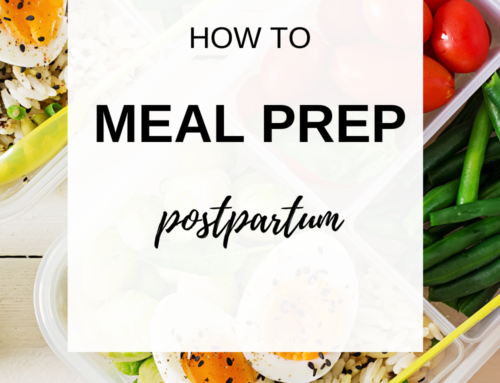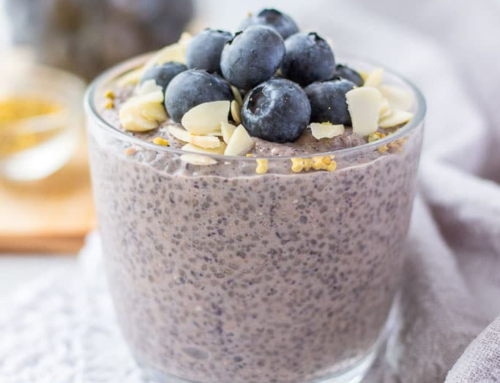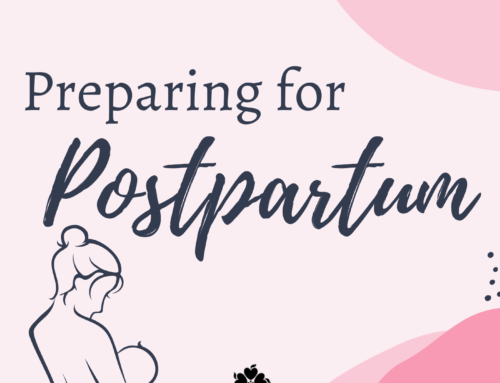Ask any mom to be why they want to breastfeed and they’ll probably tell you – “for the health benefits…it’s free… and because it helps with weight loss…”
While this might be true, many women hit a plateau, or end up gaining more weight during their breastfeeding journey. Why is this? If breastfeeding is supposed to just “melt away fat,” why do many women struggle with losing it?
Now I just want to preface and say that you just created a human being! You’re a rockstar! Don’t be too hard on yourself. We have a lot to focus on, including our mental health. Don’t let your weight be an additional stressor. Don’t expect to bounce back right away. Give yourself grace!
This blog post simply goes over the possibilities of why you’ve either gained weight while breastfeeding, or have hit a plateau.

.
Before I go into why you’re not losing weight while breastfeeding, let’s first take look at where this original weight gain comes from. The typical weight gain recommendation for someone with a BMI of 18.5-24.9, is 25-35 pounds throughout their pregnancy. So where does this 25-35 pound weight gain get distributed? (1).
- Baby: 8 pounds
- Placenta: 2-3 pounds
- Amniotic fluid: 2-3 pounds
- Breast tissue: 2-3 pounds
- Blood supply: 4 pounds
- Stored fat for delivery and breastfeeding: 5-9 pounds
- Larger uterus: 2-5 pounds
- Total: 25-35 pounds
Remember this weight gain during pregnancy is a guideline. Check out this video I made on weight gain during pregnancy.
During pregnancy, your body begins to store fat around the stomach, hip, and thigh areas for 9 months, in preparation for breastfeeding. After you deliver the baby, many women lose about half that weight gain within the first 6 weeks, then the rest may slowly come off over the next 6-12 months postpartum (2).
How many calories do you really need?
Exclusively breastfeeding mothers produce an average of 25-35 oz per day of breastmilk and the energy required to produce that milk is about 200-500 calories. Many moms, however, are able to have an abundant milk production with 1800-2200 calories (3). It is NOT recommended to go below 1500 calories, as this can affect your supply. Your body utilizes fat stores for the production of breastmilk. If women do not consume the extra calories, then their body stores are used to maintain lactation (4). Your body will generally hold on to an extra 5-10 pounds above your pre-pregnancy weight, until several weeks after weaning and this is to protect your ability to produce milk, in case of illnesses or famine/severe calorie restriction, which is often seen in fad diets. This weight is usually your breasts and weight around your hips.
The additional amount of calories (200-500 calories) is dependent on the amount of breastfeeding (exclusively or partially breastfeeding/pumping) and mother’s additional fat stores.
.

.
If a mother already has fat stores (a higher BMI), then the additional 200-500 calories, may not be needed.
.
As I explained above, the body will generally hold on to 5-10 pounds to protect your supply in case of illness or calorie restriction. There may be other reasons why you won’t lose the baby weight, but generally it comes down to diet, exercise, sleep, stress, and hormones.
So let’s find out why you’re not losing the additional 10+ pounds.
Reason #1: Your diet
You’re eating too much
Many women are told to eat an additional 200-500 calories to maintain their milk supply, but as seen above, if they have additional fat stores, this isn’t necessary. Many women don’t know what 200-500 calories equates to, plus not all calories are created equal.
For example, you can have 100 calories of cookies and 100 calories of broccoli – they’re both 100 calories, but your body is going to use them very differently. Calorie tracking apps aren’t necessarily accurate because it’s not explaining what kind of calories you’re consuming – are they nutrient dense calories (high nutrients to low calories) or calorie dense (low nutrients but high calories)?
Although I believe ALL foods fit in a diet, and there’s no “bad food” or “good food”, I do recommend 80-90% healthy foods (fruits, vegetables, whole grains, lean protein) and 10-20% indulgent foods.
.

.
You’re eating too much processed sugar
Breastfeeding requires more energy than the brain! Breastfeeding is very demanding on your body. The body’s preferred source of energy are carbohydrates, so it’s natural for your body to crave carbohydrates, the question is – WHAT kind of carbohydrates are you eating? Are you choosing cookies, pastries, soda, white bread etc or are you eating fruits, vegetables, and whole grains? To reiterate what I mentioned above, ALL foods can fit in your diet, but aim for 80-90% healthy and 10-20% indulgence.
In saying this, more and more women are reaching for heavy laden lactation cookies, Starbucks Pink drinks, Body Armor, sugar filled treats etc to help with milk supply, however this can easily pack on the calories and weight. How many of these cookies and drinks do you need to actually boost your supply?
Supply and demand is the driving force of milk production. Sure there are herbs and foods that can help with milk production, but the driving force is milk removal. Ensure either baby is efficiently draining the breast, or your pump is efficiently removing your milk. Some foods/herbs that may help with milk production are brewers yeast, oats, flaxseed, fennel, moringa etc, but try to get them from natural sources or recipes that don’t call for excess amount of sugar.
Check out these healthier, refined sugar free lactation recipes:
.
You’re not eating enough protein
Protein is the most satiating macronutrient. It also is slow digesting and keeps your blood sugar stable. Uncontrolled blood sugar, like when you’re eating too many carbs and not enough protein, is going to cause a spike in your blood sugar, then a crash, leading you to be more hungry, and more irritable. Insulin is a fat storing hormone and too much insulin at the response of carbs, is going to prevent “fat burning mode”.
Incorporating at least 20-30g of protein per meal is going to be critical for your weight loss goals as well as keeping your energy even keel.
Instead of just a bowl of oatmeal for breakfast, add 1/2 cup greek yogurt, chia seed, hemp seeds, high protein milk to it.
Instead of 1 egg, eat 3 eggs (18g protein) + 1 slice whole wheat bread and a scoop of collagen powder in your coffee.
Focus focus focus on PROTEIN
.
You’re eating too little
If you aren’t eating enough calories, your body will try to “preserve” itself by slowing down your metabolism, and hold onto the weight to protect your supply. If this continues and you are going below 1500 calories, you might notice your supply dipping as well.
Women who do short term fasting, such as for religious reasons, may not notice a dip in supply, as long as they are hydrating and nursing on demand (5).

.
Reason #2 You’re not working out
Obviously having a baby is exhausting! With the sleepless nights, and just general exhaustion of having a newborn and possibly caring for older children, it’s no wonder you don’t have the additional energy to workout. Then breastfeeding in itself feels like a workout, which can make you even more tired. Many mothers might be hesitant to work out, because they think it will jeopardize their milk supply. However, if you think about the numerous of athletes and elite runners that train for hours a day – they are still able to breastfeed. By balancing both exercise and nutrition, you may be able to manage your weight (6).
If you’re needing to lose 10+ pounds, adding physical activity (in addition to breastfeeding), even if it’s just 30 minutes a day, can help with weight management. Plus physical activity can actually GIVE you more energy.
One thing to note about exercise is the importance of building lean muscle mass. Instead of just doing cardio, incorporate strength training activities. The more lean muscle mass you have, the better your metabolism is. Use your baby has a weight or get some free weights and build your lean muscle mass.
Reason #3: You’re too stressed
Dealing with a newborn, and the issues that accompany that, such as breastfeeding struggles and returning to work etc, can all raise cortisol levels, which increases your appetite. During the “fight or flight” response, the hormones cortisol, epinephrine, and norepinephrine are released during a perceived threat, like life stressors. The ultimate goal of cortisol is to provide energy to the body during this “fight or flight”, and what better way to get energy, than by eating. This increase in cortisol, increases your appetite. When you have chronic stress, this ongoing craving of food for energy, can result in weight gain or difficulty losing the weight.
Finding activities to reduce this stress can lower your cortisol levels, which can help with weight management.

.
Reason #4: You’re not getting enough sleep
Sleep can play a huge role on your weight (7). There are two hormones that are affected by your sleep that also regulate your hunger. They are leptin and ghrelin.
Leptin is responsible for telling your brain when you are full and when it should start burning calories for energy.
Ghrelin is the exact opposite of leptin and tells your body when to eat and to stop burning calories as energy.
During sleep, leptin levels increase, and tells your brain that it doesn’t need to trigger the hunger cues. When you don’t get enough sleep, your leptin levels decrease, telling your body you need to eat and store the calories as fat so you’ll have enough energy. It makes you constantly hungry.
During sleep, ghrelin decreases, telling your body you have enough energy and you don’t need to keep eating. When you don’t get enough sleep, ghrelin increases, telling your body that it’s hungry and to stop burning calories because you “have enough energy”.
There was a study done, where “Participants with short sleep had reduced leptin and elevated ghrelin. These differences in leptin and ghrelin are likely to increase appetite, possibly explaining the increased BMI observed with short sleep duration. In Western societies, where chronic sleep restriction is common and food is widely available, changes in appetite regulatory hormones with sleep curtailment may contribute to obesity (8).
Sleep deprivation also increases your stress hormones, which can make you hungry leading to weight gain.
While I personally and professionally don’t recommend sleep training, I do encourage focusing on quality sleep.
- Going to bed at a reasonable hour
- Avoiding blue light like from your phone, tablet, TV before bed
- Possibly taking magnesium glycinate and L-theanine (both safe for breastfeeding) can help with that restful sleep
- Eating something high in protein before bed (spoonful of plain greek yogurt, hard boiled egg, cheese stick, handful of nuts)
- Stretching, doing some breath work before bed
Reason #5: Your hormones
I mentioned the hormones ghrelin, leptin, and cortisol, that affect your appetite causing weight gain, but hormones produced by your thyroid glands can affect your weight. Your thyroid gland produces hormones that are responsible for regulating the body’s metabolism as well as digestive function, muscle control, mood and bone maintenance. You may want to get your thyroid levels checked, just to make sure they are within normal ranges. Another hormone that may be preventing you from losing weight is prolactin itself – the milk making hormone, as it increases your appetite. Ever get hungry or thirsty as you’re nursing?
And for those mothers who are losing too much weight
I know we’re never happy with what we have. It’s hard when you actually don’t want to lose the weight but the weight is just coming off. Things to look at are
- Your diet – are you eating enough? How can you increase the calories
- Overworking yourself – are you forgetting to eat? Are you running around doing too much? Take time for yourself
- Hyperthyroidism – have you had your thyroid levels checked postpartum? You may have hyperthyroidism that causes your metabolism to increase
Whether you’re losing weight or gaining weight, or hitting a plateau, weight does not define who you are as a person or a mother! Your child is not going to look at you and say “wow mom, you need to lose weight.” No, your baby will love you for who you are. We are our biggest critic and the small voice in our head can do a lot of harm, so please do not think that you need to bounce back. We are new mothers, and with each consecutive baby, we are a new person and a new body.
Choose nutrient rich foods, try to sleep when you can (at least work on quality), and add some physical activity into your life, but do this because its actually healthy for you and good for your mental state.
If you would like a registered dietitian to take a look at your meals and help you with meal planning and weight management, let’s schedule something!

.


